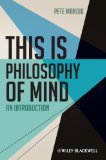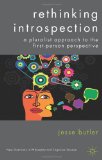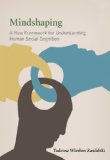August 21, 2013

This is Philosophy of Mind by Pete Mandik (Wiley-Blackwell, 2013)
(kindle ed.), (amazon.co.uk)
Book description from the publisher (from back cover):
The nature of the human mind and its relationship with the body and the outside world has long been a central concern of western philosophy, and the last few decades have seen great strides on explanations of consciousness, brain function, explications of the nature of perception and emotion, and many other issues. This is Philosophy of Mind presents a lively and accessible introduction to our current understanding of the core issues related to the philosophy of mind, including the mind-body conundrum, artificial intelligence, the nature of consciousness, and many more. While several chapters focus on the traditional positions on the mind-body problem, others offer insights on such contemporary topics as the problems of mental causation and free will, as well as theories of consciousness and intentionality. Specifically written for students of philosophy without a great deal of background, This is Philosophy of Mind helps to unravel some of the deep mysteries surrounding the nature of the human mind.
Google Books preview:
See also: Book’s companion blog
Comments (0)
- new books,philosophy of mind
May 31, 2013

Reflections of a Metaphysical Flaneur and Other Essays by Raymond Tallis (Acumen, 2013)
(amazon.co.uk)
Book description from the publisher:
In the title essay of “Reflections of a Metaphysical Flaneur”, Raymond Tallis uses the motif of the stroll, the amble, to connect a series of meditations on the freedoms that only humans possess. In subsequent essays, the flaneur thinks about his brain, his relationship to the rest of the animal kingdom, his profession of medicine and about the physical world and the claims of physical science to have rendered philosophical reflection obsolete. The book is a continuation of Tallis’s endeavours to elaborate a vision of humanity that rejects religious myths while not succumbing to scientism or any other form of naturalism. Written with the author’s customary intellectual energy and vigour these essays provoke, stimulate and challenge us to think in new ways.
CONTENTS:
Introduction
Reflections of a Metaphysical Flâneur
Part I: Brains, Persons and Beasts
1. Am I my Brain?
2. Was Schubert a Musical Brain?
3. Wickedness and Wit: Is it all in the brain?
4. Are Conscious Machines Possible?
5. David Chalmers’s Unsuccessful Search for the Conscious Mind
6. A Conversation with My Neighbour
7. Silk
Part II: Philosophy and Physics
8. Should We Just Shut Up and Calculate?
9. You Chemical Scum, You
10. Did Time Begin with a Bang?
11. A Hasty Report from a Tearing Hurry
Part III: Philosophy and Physic
12. Medical Ethics in the Real Mess of the Real World
13. Some Reflections on Caring and Not Caring
14. Coinages of the Mind: Hallucinations
15. Becoming the Prisoners of Our Free Choices
16. The Right to an Assisted Death
Epilogue: And so to Bed
See also: Author’s website
Comments (0)
- new books,philosophy of mind
May 29, 2013

The Peripheral Mind: Philosophy of Mind and the Peripheral Nervous System by István Aranyosi (Oxford University Press, USA, 2013)
(amazon.co.uk – Aug 2013)
Book description from the publisher:
The Peripheral Mind introduces a novel approach to a wide range of issues in the philosophy of mind by shifting the focus of analysis from the brain to the Peripheral Nervous System (PNS). Contemporary philosophy of mind has neglected the potential significance of the PNS and has implicitly assumed that, ultimately, sensory and perceptual experience comes together in the brain. István Aranyosi proposes a philosophical hypothesis according to which peripheral processes are considered as constitutive of sensory states rather than merely as causal contributors to them. Part of the motivation for the project is explained in the autobiographical opening chapter, which describes the author’s subjective experiences with severe peripheral nerve damage.
Although Aranyosi’s approach could be classified as part of the current “embodied mind” paradigm in the philosophy of mind and cognitive neuroscience, this is the first time that notions like “embodiment” and “body” in general are replaced by the more focused concept of the PNS. Aranyosi puts the hypothesis to the test and offers novel solutions to puzzles related to physicalism, functionalism, mental content, embodiment, the extended mind hypothesis, tactile-proprioceptive illusions, as well as to some problems in neuroethics, such as abortion and requests for amputation of healthy body parts. The diversity of the volume’s methodology–which results from a combination of conceptual analysis, discussion of neuroscientific data, philosophical speculation, and first-person phenomenological accounts–makes the book both engaging and highly informative.
Google Books preview:
Comments (0)
- new books,philosophy of mind
May 25, 2013

Rethinking Introspection: A Pluralist Approach to the First-Person Perspective (New Directions in Philosophy and Cognitive Science) by Jesse Butler (Palgrave Macmillan, 2013)
(kindle ed.), (amazon.co.uk)
Book description from the publisher:
We seem to have private privileged access to our own minds through introspection, but what exactly does this involve? Do we somehow literally perceive our own minds, as the common idea of a ‘mind’s eye’ suggests, or are there other processes at work in our ability to know our own minds? Rethinking Introspection offers a new pluralist framework for understanding the nature, scope, and limits of introspection. The book argues that, contrary to common misconceptions, introspection does not consist of a single mechanism but rather a diverse range of mental states and cognitive processes with a broad spectrum of epistemic properties. Building upon this revised conception of introspection, the book illustrates and analyzes the variety of ways in which we introspectively grasp the contents of our own minds, from the immediate phenomenal knowledge generated by conscious experience to the self-deceptive possibilities enabled by certain kinds of inner speech.
Comments (0)
- consciousness,new books,philosophy of mind
May 11, 2013

Mindshaping: A New Framework for Understanding Human Social Cognition by Tadeusz Wieslaw Zawidzki (MIT Press/Bradford Books, 2013)
(amazon.co.uk)
Book description from the publisher:
In this novel account of distinctively human social cognition, Tadeusz Zawidzki argues that the key distinction between human and nonhuman social cognition consists in our complex, diverse, and flexible capacities to shape each other’s minds in ways that make them easier to interpret. Zawidzki proposes that such “mindshaping” — which takes the form of capacities and practices such as sophisticated imitation, pedagogy, conformity to norms, and narrative self-constitution — is the most important component of human social cognition. Without it, he argues, none of the other components of what he terms the “human sociocognitive syndrome,” including sophisticated language, cooperation, and sophisticated “mindreading,” would be possible.
Challenging the dominant view that sophisticated mindreading — especially propositional attitude attribution — is the key evolutionary innovation behind distinctively human social cognition, Zawidzki contends that the capacity to attribute such mental states depends on the evolution of mindshaping practices. Propositional attitude attribution, he argues, is likely to be unreliable unless most of us are shaped to have similar kinds of propositional attitudes in similar circumstances. Motivations to mindshape, selected to make sophisticated cooperation possible, combine with low-level mindreading abilities that we share with nonhuman species to make it easier for humans to interpret and anticipate each other’s behavior. Eventually, this led, in human prehistory, to the capacity to attribute full-blown propositional attitudes accurately — a capacity that is parasitic, in phylogeny and today, on prior capacities to shape minds. Bringing together findings from developmental psychology, comparative psychology, evolutionary psychology, and philosophy of psychology, Zawidzki offers a strikingly original framework for understanding human social cognition.
Comments (0)
- cognitive science,culture,new books,philosophy of mind,psychology







